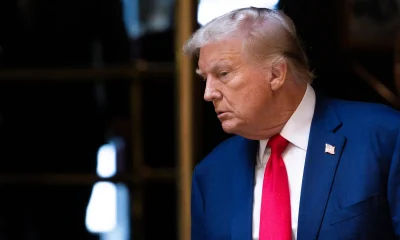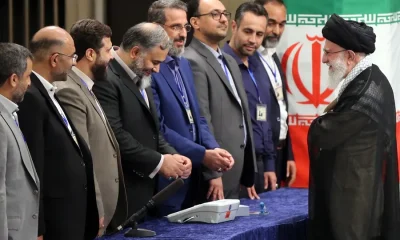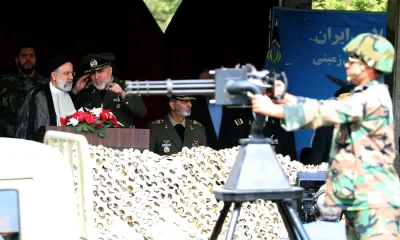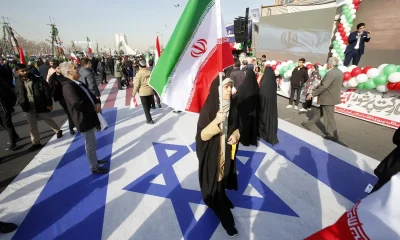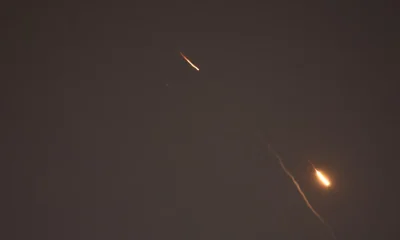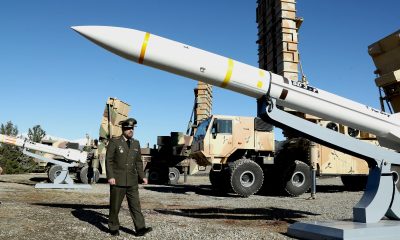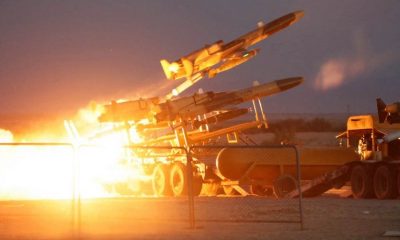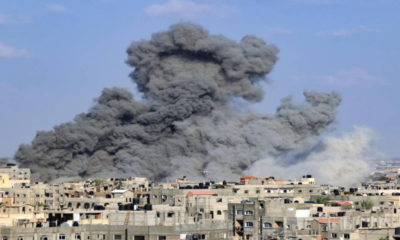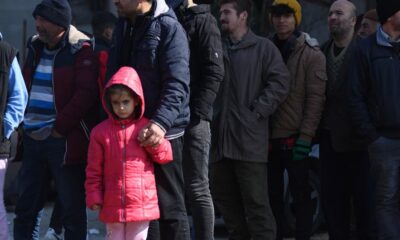International
Iran promises to punish Israel for destroying its consulate in Syria and killing a general
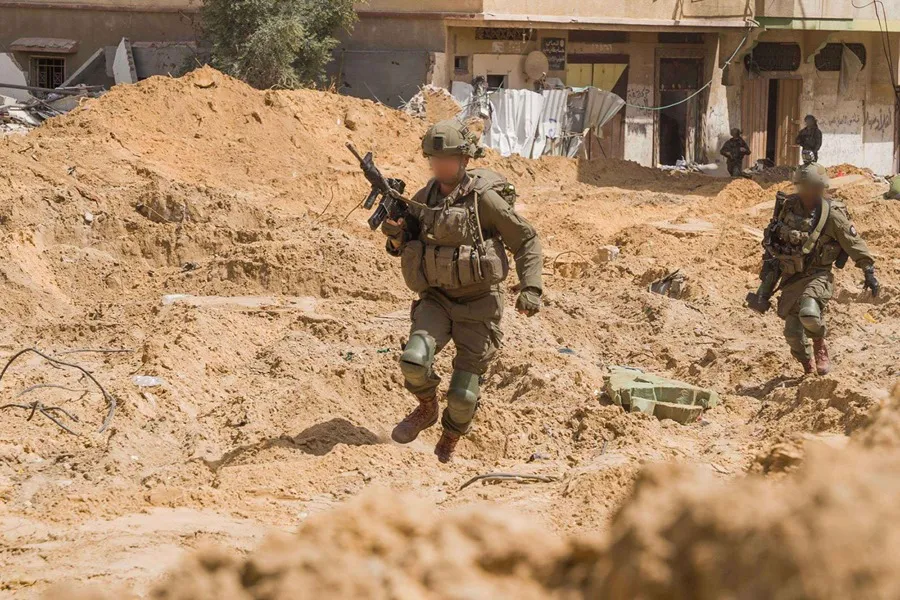
Tehran promised on Monday a harsh response against Israel for bombing and destroying its consulate in Damascus, where the Iranian ambassador resided, who came out unharmed, but who caused at least eight deaths, including an important brigade general of the Revolutionary Guard.
In one of the hardest blows to Iran in recent years in Syria, Iran’s ambassador to this country, Hossein Akbari, said on Iranian state television from Damascus that “the Zionist regime (Israel) acts against international laws, so he will receive a harsh response from us.”
“The Islamic Republic of Iran reserves its right to take countermeasures, and will decide on the type of reaction and punishment of the aggressor,” said, for his part, the spokesman of the Iranian Foreign Ministry, Naser Kanani.
The Syrian authorities accused the “Israeli enemy” of launching a bombing “around 5:00 p.m. today (14.00 GMT),” from the Golan Heights occupied by Israel against the “Iranian consulate building in Damascus,” according to an unidentified military source, which pointed out that the air defenses shot down “some” of the launched missiles.
Akbari witnessed from the embassy window of the attack on the consulate, which, according to him, was carried out with F-35 fighters that fired six missiles at Iranian facilities.
So far, Israel has not claimed this action, as is usual in its attacks on the Syrian territory.
On the battlefield, the Shifa hospital in Gaza City, the largest in the entire Strip, has been completely out of service after two weeks of military operation by the Israeli Army, which ended this morning.
“The destruction of the complex makes it impossible to resume work and the hospital has been completely out of service,” the director of Shifa, Marwan Abu Saada, told the media.
For its part, the Civil Defense of the Gaza Strip denounced on Monday that, after the departure of Israeli troops from the hospital, they have found corpses with signs of having been executed, others burned and also in a state of decomposition.
“Most of the bodies are decomposing and we reach bodies that are skeletons burned inside the medical complex,” Civil Defense spokesman Mahmud Busal said in a statement.
“It is difficult to count the number of martyrs, since the occupation raised the roads and buried the bodies in and near the Shifa complex,” Busal said.
According to the Civil Defense, there are dozens of bodies in the residential apartments in the vicinity of the medical complex for “the massacres committed by the occupation.”
The Israeli troops, who launched the operation on Shifa on March 18, claim to have killed about 200 alleged militiamen and identified 500 members of Hamas and Islamic Jihad, after interrogating about 800 suspects.
The Army insists that its military operations have not been directed against “patients, health personnel or medical equipment,” although the Gazaz Ministry of Health, controlled by Hamas, yesterday denounced that this incursion of the troops has left at least 400 dead throughout the area and the destruction of more than a thousand houses.
For Israel, this is one of the most “success” operations they have carried out since the beginning of the war, on October 7, due to the high number of alleged “terrorists” they have managed to capture in the hospital, where they assure that the militias of the Strip were regrouping.
Meanwhile, in Israel, a drone attack hit a building near the port of Eilat, in the south of the country, without injuries being reported.
According to the Israeli Army, the aggression came “from the east,” apparently from Iraq.
“After the sirens that sounded in the city of Eilat and in the Hevel Eilot area over an infiltration of hostile planes, the soldiers of the Israel Defense Forces identified a suspicious air target that crossed from the east to Israeli territory,” said a military statement.
“The target fell in the area of the Gulf of Eilat. No injuries were reported and there was minor damage to a building,” he added.
The reference to the projectile coincides with the claim, this morning, by the Islamic Resistance of Iraq of an attack “towards our occupied lands in solidarity with the Palestinian people of Gaza.”
Israeli media suggest that the target of the attack would be the frigate Saar 6, moored in the port of Eilat, since the impact occurred in a nearby building.
Eilat has been the target of launching several ballistic missiles, cruise missiles and drones in parallel to the war, but most of them came from the Houthis of Yemen, a group related to Iran.
International
Bolivia Orders Three Investigations Into Deadly Military Plane Crash
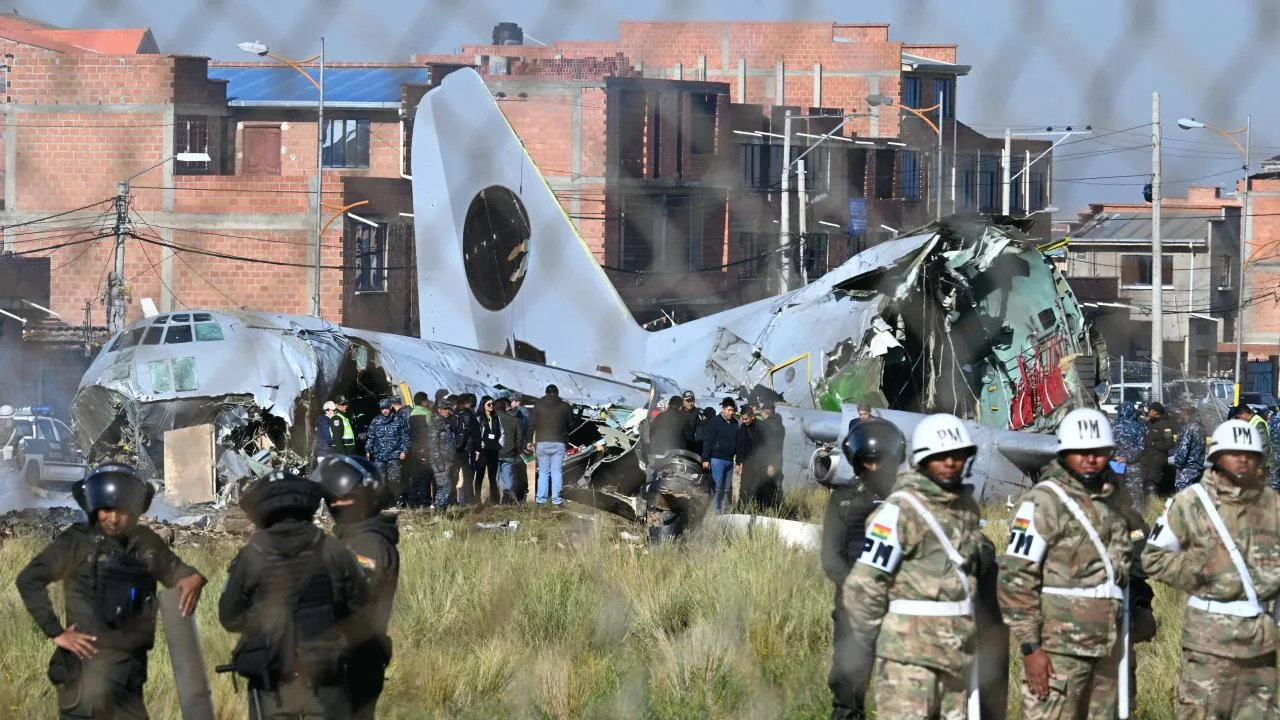
Bolivia’s Defense Minister Marcelo Salinas announced Monday that three separate investigations will be conducted into Friday’s crash of a military cargo aircraft at El Alto International Airport, near La Paz, which left at least 22 people dead.
The Hercules aircraft, operated by the Fuerza Aérea Boliviana (FAB), was transporting cash intended for the Central Bank of Bolivia when it overshot the runway after landing from the city of Santa Cruz. The plane reportedly traveled nearly one kilometer beyond the airport perimeter.
The incident sparked chaotic scenes, with individuals attempting to collect scattered banknotes. Authorities detained 51 people in the aftermath, and the government declared three days of national mourning.
Multiple Investigations Underway
The first inquiry is being led by a military board from the Bolivian Air Force, which has already taken custody of the aircraft’s black box for analysis.
Minister Salinas said two additional investigations will follow — one conducted by the insurance company and another by the aircraft’s manufacturer.
“At least two more investigations will come, that of the insurance company and that of the aircraft manufacturer,” Salinas said during a press conference in Santa Cruz.
He cautioned that the investigative process could take between three and six months, noting that the black box cannot be opened in Bolivia due to the lack of specialized laboratories for analysis.
Awaiting Official Findings
Salinas stressed that the FAB investigative board is the highest authority in the case and urged the public to wait for its conclusions to avoid speculation about the causes of the crash.
He also confirmed that the government has contacted the families of the 22 victims and the 37 injured, as well as the owners of 15 damaged vehicles, to coordinate procedures with the insurer and cover the corresponding expenses.
International
Mexico Calls for Immediate Probe After National Dies in ICE Custody
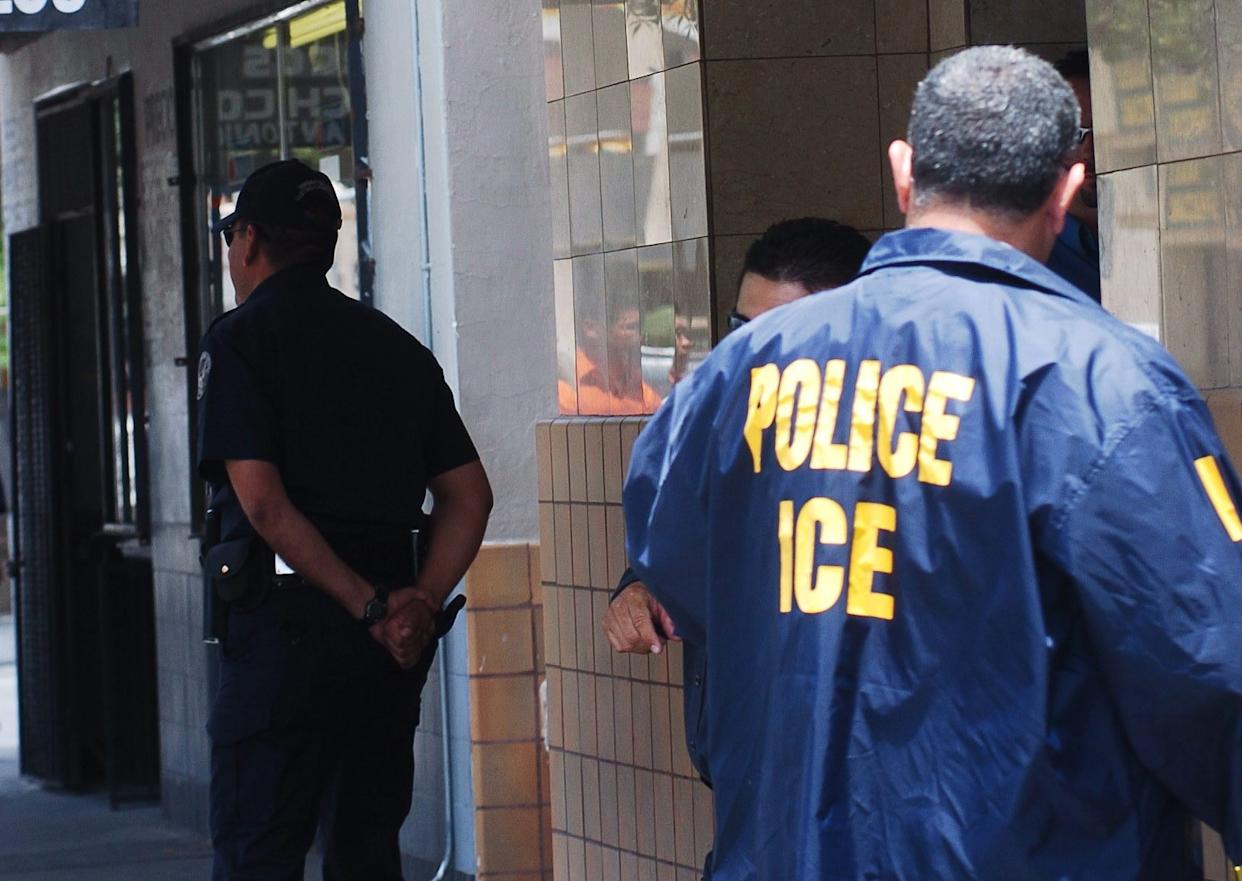
Mexico’s Secretaría de Relaciones Exteriores (SRE) on Monday called on U.S. authorities to conduct an “immediate and thorough” investigation into the death of a Mexican national while in custody of U.S. Immigration and Customs Enforcement (ICE) at a processing facility in California.
In a statement, the Mexican government described the death as “regrettable” and urged U.S. officials to clarify the circumstances surrounding the case in order to “determine responsibilities and ensure that such events do not happen again.”
Death at Adelanto Processing Center
According to available information, the Mexican citizen died at the Adelanto Processing Center in California while under ICE custody. Authorities have not yet released the individual’s identity or the cause of death.
Following the incident, Mexico’s Foreign Ministry formally requested “detailed information” from U.S. authorities, including the detainee’s medical records and custody reports.
Consular Assistance Activated
The Mexican Consulate in San Bernardino, California, has activated consular assistance protocols to provide ongoing support to the deceased’s family. Officials have contacted relatives to express condolences and offer legal guidance, as well as assistance with the necessary procedures to repatriate the remains.
“The handling of situations like this and the establishment of mechanisms to resolve them are priorities for the Government of Mexico,” the Foreign Ministry said, adding that it will formally request an investigation into any systemic conditions that may have contributed to such incidents.
Local Mexican media reported that seven Mexican nationals died while in ICE detention last year — the highest number recorded since the agency was created.
International
Anti-ICE Billboard Campaign Targets Immigration Spending in 31 U.S. Cities

More than 200 billboards criticizing U.S. Immigration and Customs Enforcement (ICE) began appearing Monday in 31 cities across the United States, including Miami, as part of a campaign highlighting the high cost of immigration enforcement operations for taxpayers.
The initiative, titled “ICE Costs Us,” was launched by the civil rights organization Mijente and will run for four weeks.
Criticism of Spending and Enforcement Tactics
The billboards feature images of ICE agents during arrests or carrying military-style weapons. According to the organization, spending on military-grade equipment for the agency has increased by 600 percent in recent years.
Several signs display messages such as:
“Your taxes are being wasted” and “ICE’s cruelty costs you $28 billion,” referring to the agency’s annual budget.
In a statement, Marisa Franco, co-founder of the Mijente Support Committee, said:
“For too long, our government has prioritized building cages and investing billions in an immigration enforcement apparatus that has left families torn apart and communities terrified.”
She added that “Millions of Americans are living paycheck to paycheck, yet this violent agency continues operating with a blank check. These decisions do not make us safer nor improve our economic security. Our billboards highlight these choices and demand a different path.”
Budget Debate and Medicaid Comparison
The campaign also draws a comparison between ICE’s funding and the estimated 17 million people who could lose health coverage under Medicaid due to federal budget cuts under President Donald Trump.
Other billboard messages seen in various cities include:
“They get billions to beat us; we get layoffs and rising rents” and “Funding ICE is a fast track to fascism.”
Organizers say the goal is to spark public debate about the allocation of federal funds for immigration enforcement and the broader economic and social impact of such policies on communities nationwide.
-

 International4 days ago
International4 days agoCocaine Production Surges 34% in 2023 as Market Expands into Africa and Asia
-

 International3 days ago
International3 days agoTrump Floats “Friendly Takeover” of Cuba Amid Rising Tensions
-

 International2 days ago
International2 days agoIran Reports 201 Dead, 747 Injured After U.S. and Israeli Strikes
-

 Sin categoría2 days ago
Sin categoría2 days agoTrump: ‘We Think It’s True’ Amid Claims Iran’s Supreme Leader Was Killed
-

 International2 days ago
International2 days agoSecurity Council to Hold Emergency Meeting on Middle East Crisis
-

 International4 days ago
International4 days agoFederal Judge Blocks Trump Policy Allowing Deportations to Third Countries
-

 International3 days ago
International3 days agoArgentina’s Senate Reviews Milei-Backed Labor Overhaul
-

 International2 days ago
International2 days agoPope Leo XIV Urges End to ‘Spiral of Violence’ in Middle East
-

 International10 hours ago
International10 hours agoBrazil’s Supreme Court Rejects Bolsonaro’s Bid for House Arrest
-

 International4 days ago
International4 days agoClinton Accuses Republican Committee of Using Epstein Case to Shield Trump
-

 International10 hours ago
International10 hours agoAnti-ICE Billboard Campaign Targets Immigration Spending in 31 U.S. Cities
-

 International10 hours ago
International10 hours agoTrump Warns of ‘Major Wave’ of Attacks as Iran Conflict Escalates
-

 International10 hours ago
International10 hours agoMexico Calls for Immediate Probe After National Dies in ICE Custody
-

 Central America10 hours ago
Central America10 hours agoPanama Canal Monitoring Trade as Middle East Conflict Disrupts Shipping
-

 International10 hours ago
International10 hours agoBolivia Orders Three Investigations Into Deadly Military Plane Crash



























